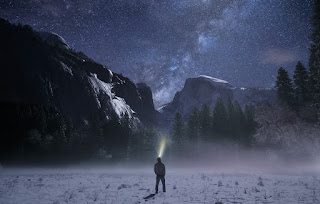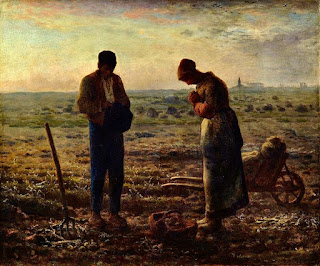Sources, sources, sources....(#5)
"and about time", any reader may justifiably be saying... As said earlier, all which came before can be skipped if only the reader finds this post and reads the few suggested following works.
All which preceeded (past any polemical ranting of mine) was only an attempt to prepare the reader for the following works. There still is a bit of definition of terms which may be helpful for those readers from modern protestant backgrounds, as all these sources are old sources, the main one from before there ever was any such thing as protestantism, nor were there anything but Eastern and Western Churches, and even that division something fairly recent to that writer, and that division purely over papal supremecy and theological hair-splitting over ONE word in the Creed.
To repeat from earlier, "meditation" or "mental prayer" in these writings will mean those operations of self and intellect, whereas the modern popular use of the word "meditation" has come to mean what classically has been termed "contemplation" which does not involve mental rumination.
When old writings use the term "priests and religious", the writer is speaking of those who have taken vows of poverty, chastity, and obedience, the "religious" typically being in an enclosed/cloistered monastery leading a life of prayer. The following writings are from spiritual directors in these settings, them seeking to bring their pupils to an intimate experience of God. Some of what they write will not apply to those not living a hidden-away life of prayer, but suprisingly very little can be said to not be of use to those living "in the world".
The first and most recently written source to be mentioned is a very small, near pocket-sized book from circa 1947 by Father Gabriel Diefenbach, O.F.M. Cap. (a Capuchin monk) highly regarded and sought for his direction of spiritual retreats for consecrated religious.
The little book (orginals hard to find, but available in facsimile reprints) is titled "Common Mystic Prayer".
This is NOT a how-to manual, but is a great work on what contemplative prayer IS and its centrality to being a seeker of, and disciple of, God and Jesus. Although the contemplative life is simple, it also can be hard, and he pulls no punches. His bibliography at the end is a gold mine of forgotten spiritual writings.
The second work to cite is also a rather short work or set of works, written by an humble spiritual director in England circa 1200-1300 AD, humble in that he wished to remain anonymous, and in that he succeeded, despite quite a few of his works surviving and being passed down generation to generation in monasteries. The best which scholars seem to be able to determine is that he was in the southwest (I believe) of England and likely a Carthusian monk. His primary works recommended are "The Cloud Of Unknowing" and its sequel "The Book Of Privy Counselling", of which both works appear (along with several others by same author) in the Penguin Classics volume titled "The Cloud Of Unknowing and Other Works" as translated from the Middle English by Spearing. Translating from Middle English to modern English is relatively straightforward if done by a scholar, and Spearing is all of that.
If you might have doubts of Spearing's translation, you can assure yourself of his accuracy by purchasing a copy of "The Cloud Of Unknowing" TEAMS Middle English Text Series edited by Patrick J. Gallacher which contains the full Middle English text, along with footnoted word-for-word translation of each unfamiliar word or spelling including the nuances, plus a glossary in the back. If you go through that trouble, you will find Spearing's work without fault.
A less-literal/more-modern-colloquial, but entirely serviceable and available in reprint, translation was done back in 1973 by William Johnston, whom I believe was at initial publication a Jesuit priest living in Japan who "went native" as for religious views in essentially becoming of amorphous "New Age" conglomerate beliefs back long before that term was invented. I bought my first copy of "The Cloud Of Unknowing" back in 1974 via that edition and have a soft spot for it despite the shortcomings of the author and text (and of which I will deal more fully in a final non-Christian sources blog entry for informational purposes ONLY). Interestingly enough, Johnston picked up on incredibly numerous parallels between the "Cloud" text and those written 200-300yrs later by San Juan de la Cruz/Saint John of the Cross, and listed them in his appendices. This also explains (past the translation difficulties of ornate Castilian Spanish) why I am not including Saint John's works in this short list of introductory texts. Make no mistake, though, Saint John was a spiritual master, well aware of both the highs and lows of the interior life and goes into incredible detail on the purification required for those who seek spiritual perfection.
There are other translations ranging from "ok" to "terrible" done by a wide variety of people ranging from early 1900s popular "spiritualists", through assorted scholars, even to include those by polyglot California Eastern religion/New Age proponents, which the reader would do well in dodging entire.
The charm of "The Cloud Of Unknowing/Book Of Privy Counselling" is that it IS a how-to manual, suitable for the beginner, and it written in the form of very short letters/chapters as if addressed across 700-800 years directly to you, the reader. Some of it is "quaint" and dated since times and linguistic practices, such as use of hyperbole, have waned in modern times, but it still as if a very dearest old family member writing directly to you out of deepest concern for your well being.
For those inclined to worry of "orthodoxy" of the writings, the author took considerable pains to prove his orthodoxy in VERY tough times, and his success is demonstrated by excerpts being included in "The Liturgy Of The Hours" of the Catholic Church, which are mandatory daily readings for all clergy and religious in the Church.
The translation's commentary and introductions are by scholars, and not by masters of religious life and spirituality, and so they all spend a great deal of words in showing just how scholarly and clever they are.....my advice is to skip them entire, and simply read the author of the work and let him speak directly to you across the gulfs of time.
As promised, this is only a short list, but with plenty enough to suffice for a lifetime of prayer. There is one other work I will mention but the work itself is massive enough to need own post before this blog entry becomes overlong.
(photo compliments of Jason Strull at Unsplash.com)



